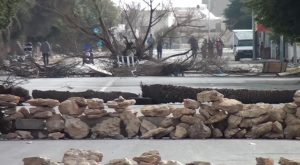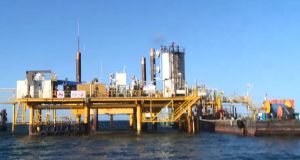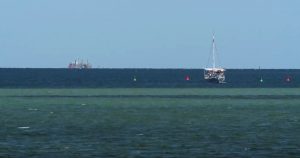The story begins with the suffering of a young man from the Tunisian island of kerkennah. A young civil society activist who has been defending the safety of his quiet island from the deadly oil spills which has damaged the fishing resources of the island.
Oil leaks are the responsibility of oil companies investing in the sea close to island of kerkennah amid the absence of the state structures control that do not follow the repair of the environmental damage due to oil spills and do not demand the companies to heal the damage and repair pipelines to avoid successive oil spills.
Ahmed Taktak, an activist in the association field, is the hero of a story in an investigative documentary about oil leaks on the island of Kerkennah, by journalist Mabrouka Khdir in collaboration with ARTICLE 19 and the Natural Resources Governance Institute in Tunisia.

The documentary shows the numerous protests in Kerkena in 2016 against the pollution left by the multinational oil companies in the region. The film ends with the hero of the story Ahmed being forced to emigrate illegally, although he has residence papers in Italy because he is married to an Italian woman. However, the prosecution of more than thirty young people who led the social movement in the island of Kerkennah made youth of the region as well as many of the sailors of the island demand the departure of these companies as they are the cause of the long-damage of the island’s beaches and the fish wealth.
“Fuel Fishing” a forty-minute investigative film by director Fethi Khdir, tries to uncover the truth behind the two biggest incidents witnessed by the island in 2010 and 2016 and show their effects on the beaches and the people there.
Journalist Mabrouka Khdir said that the biggest challenges she faced in completing the investigation is the access to information. The documentary film talks about oil leaks suffered by the island of Kerkennah, east of the city of Sfax, in recent years.
The film indicates that the lack of supervision deepens the crisis especially in light of the recent death of fish, sponges and the sea pollution that disturb the sailors of the island of Kerkennah.

The National Petroleum Services Company did not respond to the request of journalist Mabrouka Khdir to access the reports of maintenance of the pipelines that carry oil in the sea in light of accusations that the company did not maintain its equipment, making oil spills repeated unevenly between 2010 and 2016.
Civil society experts and petroleum contract specialists who have given testimonies for the film ” Fuel Fishing ” have demanded that the Tunisian state intensify its control over the oil companies and demand that they bear their environmental responsibility in order not to repeat other oil leaks that harm the sole source of the sailors’ living of the island of kerkennah .

The film “Fuel Fishing” was presented as part of a training course organised by ARTICLE 19 in Tunisia on the right of access to information for a number of journalists from the Arab world. It initiated a debate about the problems raised, especially the environmental pollution caused by oil leaks on the island of Kerkennah which is experiencing popular protests to demand development and protection of the sea environment in a peninsula invested by four international companies in the field of exploration for oil and natural gas.
TunisianMonitorOnline (MNHN)




